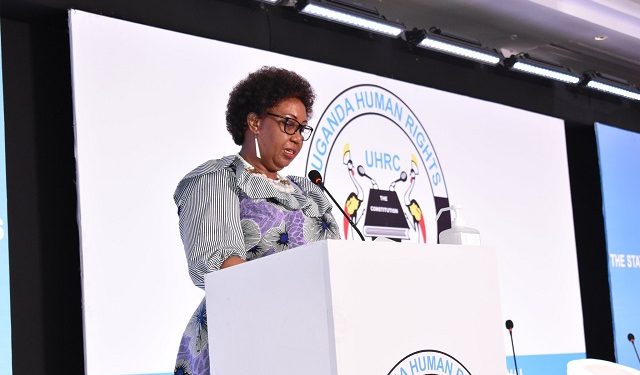The tribunal of the Uganda Human Rights Commission-UHRC shall resume operations in January 2022, the commission chairperson Mariam Wangadya has revealed.
Speaking at the sidelines of the launch of the 2019 and 2020 Commission annual reports on Monday at Sheraton Hotel Kampala, the Mariam Wangadya said that the tribunal shall start with cases that had been allocated for hearing and those that were up for allocation. She says the tribunal shall move fast to dispense justice to the aggrieved.
The 1995 Constitution under article 53 gives the commission powers of court. It can issue the summons or other orders requiring the attendance of any person before the Commission and the production of any document or record relevant to any investigation by the commission.
However, the tribunal was not fully constituted following the death of former chairperson Meddie Kaggwa in November 2019 and hence couldn’t sit.
According to the report, by end of 2020, the tribunal caseload stood at 1,200 cases up from 1,098 in 2019. By 31st December 2020, 461 files were pending allocation for hearing, 362 were pending hearing and 377 others were partly heard.
While presenting the 2020 annual report, Ruth Ssekindi, the Director Monitoring and Investigations said that the Commission received a total of 3,283 cases in 2020, but was able to investigate only 1,281 complaints on alleged human rights violations.
However, not all those investigated were concluded as only 545 cases representing 43 percent of the investigated cases were completed while the remaining 736 cases making 57 percent were partially investigated.
Ssekindi says that by the close of 2020, the commission had a backlog of 780 complaints at the level of investigations.
Although the tribunal couldn’t sit, the Commission concluded some cases through mediation. Ssekindi says that of the cases received, 37 complaints were handled through mediation. But this is also low compared to the number of cases mediated in 2019 which totaled to 166. The low numbers were blamed partly on the effects of COVID 19 and the lockdown instituted.
Cases mediated involved denial of child maintenance and denial of basic education. In all mediated matters, the report reads, parties signed memoranda of understanding showing details on how they agree to resolve their disputes.
The report also indicates that the government has paid in compensation award to victims of human rights violations over 3.5 billion shillings. The payments result from tribunal awards which started from 1st July 2015.
Although the law puts the burden of compensation on individual torture perpetrators, the commission often awards compensation to be paid by government institutions. Commissioner Shifrah Lukwago says that some of the perpetrators earn little money and can’t pay victims easily.
She says the victims could end up suffering as they wait to get compensated with for instance 20 million Shillings by a perpetrator who earns only 400,000 Shillings per month. She says in that case, the government which is the employer compensates the victim and deals with the perpetrator in some other way.
Commissioner Meddie Mulumba says that no one should be subjected to torture, but in the event that such an unfortunate act happens, the victims should get justice and be compensated. URN











